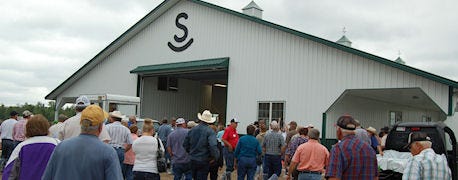
Eight years ago, the annual Minnesota State Cattleman Association's Summer Tour was supposed to be hosted in Roseau County.
Then something totally unexpected hit the region.
In July 2005, a beef cattle herd was found to be TB-positive. By the fall 2005, TB was found in several more herds and in white tail deer in the area. By January 2006, USDA downgraded Minnesota's TB status, which brought increased herd testing and movement restrictions.

Beef tour. More than 300 folks took part in the annual Minnesota State Cattleman's summer tour in Roseau County. One of the stops was at Skime Ranch.
It was a challenging time for farmers and the beef industry, as state agencies and lawmakers debated what to do. By June 2006, the Legislature passed a bill that approved additional funds for TB eradication and increased the Board of Animal Health's authority to test animals as needed, and by August, statewide TB surveillance testing began. By January 2009, 6,200 cattle had been removed from the TB management zone.
Those early efforts and the collaboration among all paid off. By October 2011, USDA reinstated Minnesota's TB-free status.
And come 2013, northwestern Minnesota cattlemen and women were once again willing to host the MSCA's summer tour. One of the tour stops Tuesday was to visit Roger and Bernice Skime's family ranch in Skime, where bovine TB was first found eight years ago.
"This is a big event for you and for me. We should celebrate," said Bill Hartmann, BAH state veterinarian. "Sixty-eight cattlemen sacrificed their herds for the cause. Many of them did that for the cattle industry state-wide. And one of them was Roger Skime. He had 600 cows and 25 years into his herd. It was a very emotional time [deciding to depopulate] and it was a big sacrifice."
After losing his cattle, Skime gradually began rebuilding his herd. Today, the ranch has 300 head of fall calving cows, consisting of Angus, Red Angus and Tarentaise cows and bulls.
Even after extensive investigation, Hartmann said that no one knows how TB got into Minnesota or where it came from.
"Now is the time to close the book on TB," he said. "The Board of Animal Health will do everything it can so it doesn't come back to haunt us."
About the Author(s)
You May Also Like






